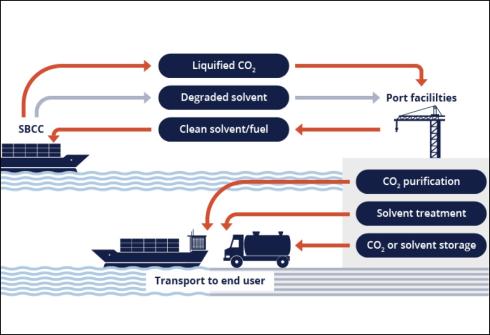Charting a course towards CO₂ port readiness: Insights from the 3rd CSIIG workshop
As key enablers of OCC and broader CO2 transport and storage infrastructure networks, Europe’s two largest ports are poised to play a vital dual role in helping society tackle the climate crisis.
With CCUS projects around the North Sea region progressing, and OCC (Onboard Carbon Capture) very much regarded as a key part of near- to medium-term decarbonisation options for the maritime sector, 69 experts and key stakeholders from 46 organisations came together for the 3rd and final EverLoNG CSIIG (CO2 Shipping Interoperability and Industry Group) online workshop on 12 February to chart progress and discuss the remaining challenges pertaining to OCC and CO2 handling and offloading.
Chair: Richard L Stevenson (SCCS/The University of Edinburgh)
Introduction: The EverLoNG project & WP2 overview
Welcome: Richard L Stevenson, Project & Research Analyst, SCCS/The University of Edinburgh
Extending a warm welcome, Richard outlined the purpose of the CSIIG as a forum that brings together experts and key stakeholders from across OCC and CCUS spectra to discuss and help efforts to develop offloading strategies and establish guidelines for CO2 shipping interoperability, port readiness, port infrastructure, CO2 specifications, and solvent handling.
EverLoNG project & WP2 OCC in the full CCUS chain: Ragnhild Skagestad, Senior Research Scientist, SINTEF
In the context of the task at hand – decarbonising the maritime sector, which produces around 1 billion tonnes of CO2 emissions each year, which equates to around 3% of the global annual total – Ragnhild summarised the key objectives of the EverLoNG project, highlighting Work Package 2, under the auspices of which the CSIIG takes place.
- WP1 - Demonstrate OCC on-board of two LNG-fuelled ships
- WP2 - Facilitate the development of OCC-based full CCUS chains
- WP3 - Optimise OCC integration to existing ship infrastructure
- WP4 - Perform life cycle assessment and techno-economic evaluation: to show the impact of this technology, from both economic and environmental viewpoints
- WP5 - Facilitate the regulatory framework for OCC
Part 1: Ports and OCC
Port of Rotterdam: Onboard Carbon Capture: Steven Jan van Hengel, Sr. Business Development Manager Sustainable Transport, Port of Rotterdam
Referencing the results of a recent collaboration between the Port of Rotterdam (PoR) and DNV, Steven acknowledged that, alongside improved energy efficiencies and cleaner, alternative fuels, OCC can be an important and “permanent” shipping technology through 2050 and beyond. Accordingly, PoR is currently developing infrastructure to handle CO2. With the Porthos project taking FID in 2023, Steven outlined a not-too-distant future where PoR is well positioned as one of the frontrunners, offering a comprehensive CO2 services ecosystem to its customers.

Port of Antwerp-Bruges: CCUS hub in Europe: Arne Strybos, Program Manager Fuel Transition, Port of Antwerp-Bruges
Highlighting the significant industrial base, and particularly prominent chemicals sector, in and around the Port of Antwerp-Bruges (PoAB), Arne outlined the range of CO2-related projects and initiatives currently in development, including the Antwerp@C project and the Fluxys c-grid joint venture to establish a CO2 network operator. Different initiatives cover CCS and CCU, with shipping, storage, and pipeline infrastructure being crucial facets in the ambition to manage millions of tonnes of CO2 annually. OCC is also a significant part of the port’s plans, and Arne touched on several key hurdles that need to be addressed. These included CO2 specification, the possible status of OCC CO2 as waste and the smaller OCC CO2 volumes compared to industrial sources or from shipping (as cargo). He emphasised the importance of clarifying the legal status of OCC CO2 under both maritime policy and land-based policies, including building out the right tax incentives and customs requirements.

“Maritime companies need facilities to bring OCC CO₂ onshore. We, as a port, want to support them by providing the necessary service and infrastructure to enable them to reach their sustainability targets, with OCC being one of the possible climate solutions.” Arne Strybos, Port of Antwerp-Bruges
CCShip project: GHG emissions of OCC under the FuelEU Maritime regulation: Donghoi Kim, Research Scientist, SINTEF
This study, conducted under the CCShip project, aims to develop cost-effective OCC solutions and to understand OCC relative to other emissions reduction options. It examined nine ship propulsion scenarios based on different combinations of fossil fuels and engine types. Taking a well-to-wake (WtW) approach to calculate the entire lifecycle GHG intensity of each scenario, both with and without OCC, it has produced some interesting results. Donghoi explained that while LNG-fuelled vessels tend to exhibit a lower tank-to-wake (TtW) GHG intensity, the study found that, once OCC is applied, oil-fuelled vessels were in fact less GHG-intensive and more cost-effective than LNG-fuelled ships when assessed from a broader, all-encompassing WtW perspective. This is largely attributed to methane slip associated with LNG usage. Donghoi added that while these findings indicate that OCC can play an important role in decarbonising ships propelled by more conventional fossil fuel configurations up to around 2044, compliance in subsequent periods would require further and more stringent measures.

“With the FuelEU Maritime regulation coming into force in 2026, our study shows that OCC could be an effective decarbonisation option for existing and planned non-LNG fossil-fuelled vessels.” Donghoi Kim, SINTEF
Part 2: EverLoNG CO2 Offloading Roadmap & Port Readiness
Roadmap of a European offloading network: Ragnhild Skagestad, Senior Researcher, SINTEF
Ragnhild offered more evidence that OCC stands ready to fulfil its role in maritime decarbonisation, as she echoed earlier comments and emphasised the success of the EverLoNG capture demonstration campaigns aboard the Seapeak Arwa and SSCV Sleipnir vessels, both of which achieved capture rates over 80%. Projecting into the future to illustrate how an offloading network might develop towards 2050, she highlighted a number of challenges that will need to be addressed. These included low volumes of CO2 from OCC, the time elapsed between offloads, the unpredictable operating profiles of ships that have adopted OCC, interoperability between ports, and the flexibility required within ports to accommodate ships of varying sizes and profiles. Consistent with the earlier port presentations, Ragnhild concurred that it would be sensible for larger ports to take the initiative, and that those with existing CCUS plans, like both PoR and PoAB, would undoubtedly find it easier to develop a business case.
Port Readiness Tool for CO2 (PRT-CO2): Richard L Stevenson, Project & Research Analyst, SCCS
The PRT-CO2 is a dual-path structured framework designed to support port communities in evaluating their readiness for two distinct yet complementary operations: the handling and offloading of CO2 from OCC and CO2 shipping. Richard explained the importance of key stakeholder engagement through the CSIIG forum in terms of how it has helped shape the tool that, it is hoped, will be taken on by some of those same stakeholders to be further developed into a fully functioning and comprehensive tool for use across the sector. Richard added that, in that sense, the PRT-CO2 is very much a starting point for further development, signalling to ports the types of questions that need to be posed and the activities that need to be undertaken. The tool itself follows a 9-level framework that is inspired by the widely-used and extensively referenced NASA’s TRL framework. It will be publicly accessible by the end of the project.
Click here to access the presentation slides

